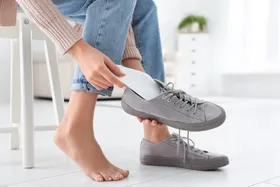What Is Excessive Supination of the Foot and Its Risks
Learn about the difference between supination and pronation, what excessive supination means, and what conditions it increases the risk of.
Published January 26, 2022
Weight transfer is dynamic. As you move from one point to the other, your body compensates for the motion, redistributing your weight as you go to guarantee balance. The feet are central to weight transfer as they ensure your whole body is correctly aligned.
Supination vs. Pronation: What Is the Difference?
Supination and pronation are two primary motions that occur during walking. With supination, weight is placed on the outside of the foot while walking or running. Contrarily, with pronation, the person moves the foot naturally from side to side as they walk. Both supination and pronation form part of the regular gait cycle. However, it becomes abnormal when there is overpronation or underpronation (excessive supination).
Excess Supination While Walking
A foot or ankle that rolls outward when walking is excessive supination. The result is that instead of weight transfer to the ground through the foot, the foot absorbs the weight and then redistributes it to the lower limb. This places additional stress on the muscles, ligaments, and tendons of the lower limb.
Foot supination usually occurs because of an imbalance in muscle action or a high arch. The resultant effect is that the person will place weight on the outer edge of the foot when walking or running. The only way to conclude if there is excessive supination is to perform a gait analysis.
Risks of Excessive Supination
Excess supination can lead to long-term problems.
When excessive supination occurs, there is an incorrect alignment of the foot. This places undue stress on the ankle, knee, hip, and lower back joints. If not managed promptly, it can result in complications like ankle sprains, shin splints, stress fractures, hammertoes, iliotibial band pain syndrome, etc. Early treatment is necessary so that excess supination can be managed. Otherwise, it can become a rigid and arthritic condition.
Related Articles

The Best Orthotic Insoles for Sesamoiditis
Upstep Staff
December 9, 2024

Is Plantar Fibroma Surgery Even Worth It?
Babafemi Adebajo
August 17, 2022

Vitamins for Shin Splints: How Supplements Can Aid Recovery
Babafemi Adebajo
October 1, 2025

The Role of Insoles in Correcting Gait Imbalances
Amanda Backus
March 14, 2024

Best Insoles for Wide Feet
Babafemi Adebajo
May 14, 2025
Related Posts
Babafemi Adebajo
Best Tennis Ball Exercises for Plantar Fasciitis
Babafemi Adebajo
Best Ways to Straighten Your Hammer Toe at Home
Dr. Pooja Gajare
Tailor’s Bunion: Causes, Symptoms, and Treatment
Upstep Staff
7 Best Exercises for Overpronated Feet
Janik Sundstrom
How Flat Feet Can Affect Your Athletic Performance
Babafemi Adebajo



